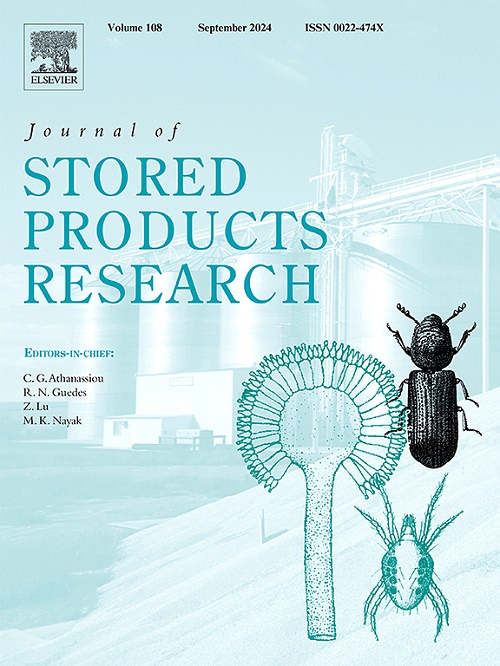Effects of storage time on nutritive qualities, volatile components, and microbial community of native grass hay
IF 2.7
2区 农林科学
Q1 ENTOMOLOGY
引用次数: 0
Abstract
Microbial activity in stored native grass hay may induce quality deterioration and alter flavor profiles, resulting in significant economic losses and forage safety risks. This study elucidated the association between microbial communities, nutritive qualities, and volatile components during native grass hay storage. High-throughput sequencing was conducted for determining the microbial composition of stored native grass hay. Headspace solid-phase microextraction-gas chromatography-mass spectrometry was performed for identifying volatile compounds in native grass hay. This study also assessed the correlation of volatile compounds with the hay microbiome. According to the obtained results, the water-soluble carbohydrate and crude protein content of native grass hay significantly decreased by 14.37% and 25.24%, respectively, after 360 days of storage (P < 0.01). From the 112 volatile compounds identified in native grass hay, hydrocarbons and alcohols were the major contributors to the volatile profile characteristics of native grass hay during storage, while ketones, heterocyclic compounds, and aromatic compounds were the minor constituents. Forty-nine potential spoilage markers were screened based on OPLS-DA and VIP values. The dominant fungi at the phylum level were Ascomycota and Basidiomycota. Alternaria and Kabatiella were the main fungal genera during the storage of native hay. Correlation analysis showed that 3 key volatile compounds (eucalyptol, geranyl acetone, and dihydroactinidiolide) exhibited a high association with quality loss and Aspergillus of native grass hay. The present findings could improve our knowledge about how storage affects microbial communities and volatile components in native grass hay.
贮藏时间对本地干草营养成分、挥发性成分和微生物群落的影响
贮藏的本地干草中的微生物活动可能会导致质量下降和风味改变,从而造成重大经济损失和饲草安全风险。本研究阐明了本地干草储藏过程中微生物群落、营养品质和挥发性成分之间的关系。研究人员采用高通量测序技术确定了贮藏的本地干草的微生物组成。顶空固相微萃取-气相色谱-质谱法用于鉴定本地干草中的挥发性化合物。这项研究还评估了挥发性化合物与干草微生物群的相关性。结果显示,贮藏 360 天后,本地干草的水溶性碳水化合物和粗蛋白含量分别显著下降了 14.37% 和 25.24%(P < 0.01)。在本地干草中鉴定出的 112 种挥发性化合物中,碳氢化合物和醇类是本地干草贮藏期间挥发性特征的主要成分,酮类、杂环化合物和芳香族化合物则是次要成分。根据 OPLS-DA 和 VIP 值筛选出了 49 个潜在的腐败标记。在真菌门中占优势的是子囊菌门和担子菌门。Alternaria 和 Kabatiella 是本地干草储藏期间的主要真菌属。相关分析表明,3 种主要挥发性化合物(桉叶油醇、香叶基丙酮和二氢内酯二内酯)与本地干草的质量损失和曲霉菌有很高的相关性。本研究结果有助于我们更好地了解贮藏如何影响本地干草中的微生物群落和挥发性成分。
本文章由计算机程序翻译,如有差异,请以英文原文为准。
求助全文
约1分钟内获得全文
求助全文
来源期刊
CiteScore
5.70
自引率
18.50%
发文量
112
审稿时长
45 days
期刊介绍:
The Journal of Stored Products Research provides an international medium for the publication of both reviews and original results from laboratory and field studies on the preservation and safety of stored products, notably food stocks, covering storage-related problems from the producer through the supply chain to the consumer. Stored products are characterised by having relatively low moisture content and include raw and semi-processed foods, animal feedstuffs, and a range of other durable items, including materials such as clothing or museum artefacts.

 求助内容:
求助内容: 应助结果提醒方式:
应助结果提醒方式:


